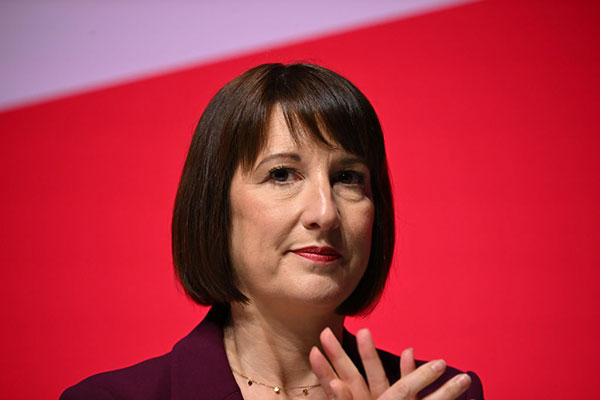Reeves mulls pension tax-free cash raid
The move could affect one in five retirees and raise £2 billion a year for the Treasury as the chancellor seeks ways to prop up the nation’s finances.
9th October 2024 11:18
by Craig Rickman from interactive investor

The Autumn Statement rumour mill is ramping up the gears as reports surface that Rachel Reeves is weighing up a cut to pension tax-free cash, as she considers ways of filling the fiscal “black hole”.
In what would be a blow to savers, an article in The Daily Telegraph published early this morning, claimed the chancellor may slash the maximum tax-free cash entitlement from £268,275 to £100,000.
- Invest with ii: SIPP Account | Stocks & Shares ISA | See all Investment Accounts
Two organisations, the Fabian Society and the Institute for Fiscal Studies (IFS), have proposed such a measure since Labour won power, which according to the latter would impact one in five retirees.
In a report published on 11 September, the IFS said: “This subsidy to pension saving has an estimated long-run annual cost of £5.5 billion, with 70% of the relief going to pensions accumulated by those in the top fifth of earners when making their contributions.”
It added: “Reducing the amount that can be taken tax-free from £286,275 to £100,000, for example, would affect about one in five retirees (and almost half of those who had been employed in the public sector) but would mean about 40% of pension wealth lost the benefit of the tax-free component. Such a change would raise around £2 billion a year in the long run (40% of the long-run revenue yield from abolishing the tax-free component completely), with losses concentrated among the relatively wealthy.”
We should note, these are purely rumours at this stage. But given the impact this could have on how much tax you pay in retirement, let’s answer some of the key questions you might have.
Who would this affect?
Put simply, if this came to pass it would mean anyone retiring with pension pots of £400,000 or more would likely pay more tax in later life - penalising those who saved particularly hard.
The tax-free lump sum has already reduced significantly since the start of the previous decade, as the government hacked away at the lifetime allowance (LTA), which has now been scrapped.
In 2011-12, when the LTA was £1.8 million, the maximum tax-free cash entitlement was 25% of this figure, so £450,000.
Any decision to reduce the tax-free entitlement could also have a sizeable impact on healthcare workers, according to Graham Crossley, NHS pension specialist at Quilter. He urged the government to “tread carefully”, as it could devastate savers’ well-laid retirement plans.
“We could see significant numbers of senior healthcare workers bringing forward their plans to retire to avoid whatever the next attack on their pension could be. We recently saw consultants accept pay deals, but if the government then takes away some of that benefit by taxing the extra lump it created, we could see a return to pay unrest and strikes.”
How likely is it to happen?
The government has repeatedly stressed: “We do not comment on speculation around tax changes outside of fiscal events.”
As such, whether this will make the Budget’s red book is impossible to predict with any accuracy.
- Sign up to our free newsletter for share, fund and trust ideas, and the latest news and analysis
- How to build a £1million pension and ISA portfolio
Ever since a Treasury audit revealed a £22 billion “black hole” in public finances, rumours have swirled that wealth and pension taxes will be hiked, and various tax-free loopholes will either be reduced or kiboshed.
Labour’s manifesto pledge not to increase the headline rates of income tax, national insurance (NI), VAT, and corporation tax, has significantly narrowed its options when looking for quick and easy wins to raise revenues.

What are the current rules and options around tax-free cash?
At present, the maximum tax-free cash is 25% of your total pension funds, capped at £268,275, which is 25% of the previous LTA. With most schemes, the earliest you can draw this is age 55 (rising to 57 in 2028), however some allow access sooner. You may be able to take more than £268,275 if you registered for one of the various lifetime allowance protections.
If you have a defined benefit (DB) scheme, the rules around tax-free cash can be a bit more complicated. Check with your scheme to find out where you stand.
When you reach retirement, you don’t have to take all your tax-free cash in one hit but can if you want to. With the remainder you can either buy an annuity or move it into drawdown, using something like a self-invested personal pension (SIPP). With the latter, you can start drawing income or further lump sums either now or in the future, and these will be taxed at your marginal rate at the time of withdrawal.
- 11 ways SIPPs can help you achieve a dream retirement
- Check whether you could pay less in pension charges by using our SIPP comparison calculator
Alternatively, you could draw your tax-free cash in instalments, using what’s called an uncrystallised funds pension lump sum (UFPLS). This is where 25% of your withdrawal is tax free, while the remainder is taxable. For instance, you’re a basic-rate taxpayer and take £10,000 from your SIPP under UFPLS: £2,500 (25%) is not taxed, while £7,500 (75%) is taxed at 20% (£1,500) - an equivalent tax rate of 15%.
Finally, you can take a smaller portion of tax-free cash. Let’s say you have a £300,000 pension pot that you are yet to touch and need £20,000 for a new kitchen, but you’re still working, so do not require any income. In this example, you could move £80,000 of your pot into drawdown, taking £20,000 of this as tax-free cash. The £60,000 could be left in your SIPP, while you can make further decisions with the remaining £220,000 untouched pension when you need to.
Would there be complications to reducing tax-free cash?
As the IFS noted in its September report, one is that it would involve some degree of retrospection, otherwise those who had saved hard under the rules at the time would be unfairly treated.
“People could reasonably argue that they had saved on the understanding that they would be able to take 25% of their pension tax-free. A slower transition would temper that retrospection but would also need to be weighed against the ongoing costs of providing large tax subsidies for individuals with sizeable pension pots.”
Failure to add any transitional protection for those whose tax-free cash entitlement exceeds any reduced amount could be met with fierce opposition.
What should I do before the Budget?
This is a question that lots of people would like to know the answer to right now. And unfortunately, the solution is not straightforward.
As a general rule, it’s best to avoid making knee-jerk decisions with your portfolio based on speculation. We have no idea what the government will do until Reeves delivers her 2024 Autumn Statement in precisely three weeks’ time.
While you can take your tax-free cash now if you want to, it’s important to examine the potential drawbacks of doing so.
Let’s assume you took the full amount today and moved the money into your bank account – and Labour leaves the current system untouched on 30 October.
- Seven pension tips I learned as a financial adviser
- Will Labour make these big changes to the state pension?
First, the withdrawal would lose its inheritance tax (IHT) exemption, so your heirs could pay up to 40% on the amount once you pass away.
Second, unless you shovel the money into another tax wrapper, such as an individual savings account (ISA), any future growth or interest will be taxable.
And third, any tax-free cash you withdraw would lose the facility to potentially accrue a higher amount in the future. This, of course, hinges on whether your pension pot increases in value.
If you’re concerned about what might happen, the best thing to do right now is speak to a regulated financial adviser.
These articles are provided for information purposes only. Occasionally, an opinion about whether to buy or sell a specific investment may be provided by third parties. The content is not intended to be a personal recommendation to buy or sell any financial instrument or product, or to adopt any investment strategy as it is not provided based on an assessment of your investing knowledge and experience, your financial situation or your investment objectives. The value of your investments, and the income derived from them, may go down as well as up. You may not get back all the money that you invest. The investments referred to in this article may not be suitable for all investors, and if in doubt, an investor should seek advice from a qualified investment adviser.
Full performance can be found on the company or index summary page on the interactive investor website. Simply click on the company's or index name highlighted in the article.
Important information – SIPPs are aimed at people happy to make their own investment decisions. Investment value can go up or down and you could get back less than you invest. You can normally only access the money from age 55 (57 from 2028). We recommend seeking advice from a suitably qualified financial adviser before making any decisions. Pension and tax rules depend on your circumstances and may change in future.